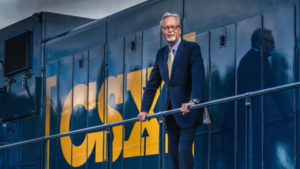Caltrain Board postpones adopting reduced train schedule
Written by jroodCalifornia's Caltrain Board of Directors voted unanimously to postpone a decision on a reduced train schedule until April 21 and directed staff to work to identify additional funds that would make the cuts unnecessary. Board members expressed the desire to make no cuts to the current 86-train schedule, which has achieved record-level ridership. Director Adrienne Tissier, who also chairs the Metropolitan Transportation Commission, said she was "extremely frustrated" at the prospect of cutting the rail service. "The system is not broken, but we're looking today to break it. It is a model for a system that runs beautifully," said Tissier. The service reductions are under consideration due to a projected $30 million deficit in Fiscal Year 2012. The proposed 76-train schedule presented to the Board today offered significantly more service than an earlier 48-train schedule. The vote to postpone a decision about service reductions followed a presentation about a recent annual ridership count, which showed Caltrain customers using the rail service at an all-time high. The count, conducted in February, shows average weekday ridership at 41,442, an increase of nearly 13 percent over last year. A preliminary budget presentation at the meeting showed Caltrain can close its budget deficit under a 76-train schedule by using one-time-only funds. To retain the current 86-train schedule Caltrain would need an additional $3.5 million in funding. "We need to go back in the next two weeks for that $3.5 million," said Tissier. "We can bring full service back. We can keep stations open. We can keep Baby Bullet alive ... Why stop short today?" Additional funding possibilities include right-of-way repayment to SamTrans from the Santa Clara Valley Transportation Authority, funds allocated for electrification and the Dumbarton Rail Corridor, and regional money from the Metropolitan Transportation Commission for maintenance that could be converted to operating funds. Without a dedicated source of funding, Caltrain struggles every year to put together an operating budget. Director Omar Ahmad said, "This is not a sustainable budget ... We need to put forward a budget that we can look people in the eye and say this is sustainable." The Caltrain partners and MTC have been working with community coalitions to address the long-term funding of the rail system, which does not have a permanent, dedicated source of revenue. The Silicon Valley Leadership Group, which has made Caltrain's fiscal crisis its primary focus, is hosting a series of town hall meetings to address the problem.





